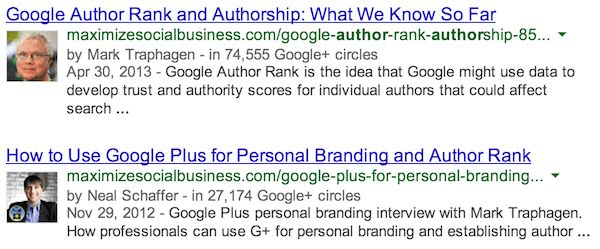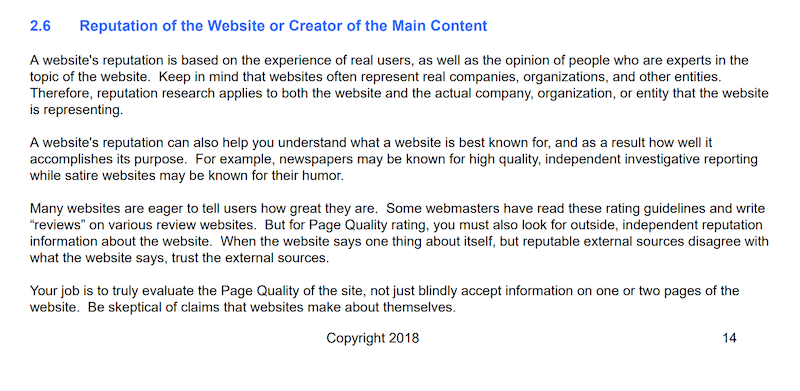Google is famous for experimenting with new features in search, and just as famous for abruptly and unceremoniously killing them.
The examples are legion. Remember the personalized vs. global search toggle? Or in-depth articles? (The latter still exists, but has become almost invisible in the SERPs.)
One of the longest-lasting of those “Google giveth; Google taketh away” experiments was Google Authorship.
I bring it up not out of a sense of nostalgia, but because in the latest update to Google’s Search Quality Rater Guidelines, “reputation of the creator of the content” is mentioned for the first time, and features prominently throughout the document.
The Search Quality Rater Guidelines (SQRG) are the guiding principles used to train the human raters who help evaluate the effectiveness of Google’s search algorithms.
That is, they provide a sort of benchmark against which Google engineers can ascertain how close their search results are to what real humans think of as “quality content.”
It would be very wrong to think of anything in the SQRG as a search ranking factor.
Nevertheless, it gives us a good picture of what Google engineers are aiming for in the pages that will bubble to the top of Google.
The fact that author reputation and credibility are now included in the quality rater guidelines is significant. It means that the real aims of the Google Authorship project never died, even if their explicit display in the SERPs never returns.
A Brief History of Google Authorship
Google Authorship was a feature that appeared in Google search results for a little over three years, from June 2011 through August 2014. The project allowed and encouraged web authors to identify themselves using a rel=”author” attribute on links between their byline on a content page and an author profile page.
Shortly after the first announcement of authorship markup, Google’s social network Google+ was unveiled. Google soon made it clear that linking rel=”author” to an author’s Google+ profile would be their primary means of author verification.
Why would authors want to bother using rel=”author”?
Google held out two carrots to incentivize adoption:
- Matt Cutts hinted in an early Authorship instructional video that at some point author authority might become a ranking factor. In other words, if Google could determine that a given author had high authority for a given topic, they might rank higher a new piece of content on that topic by that author.
- Author photo-rich snippets in search results. For most of the run of Authorship, the Google+ profile photo of the author of a content piece might be shown next to search results for that page. At various times Google also experimented with having an author byline in the snippet (that linked to more content by that author).
Here is what a typical Authorship rich snippet looked like:

By the end of 2013, there were hints that Google Authorship might be phased out.
Author photos became rarer, then disappeared altogether, leaving only the byline.
Finally, in late August 2014, Google’s John Mueller announced that Authorship results were being completely removed from search results.
What Was Authorship All About?
Google Authorship actually existed far longer in the SERPs than most search display experiments by Google do. It was one of the most disruptive changes to the search page ever (at its height, for some queries, nearly all the first page results had author photos).
Google invested a lot of resources into it, including a dedicated team. So was it all for naught?
I don’t think so.
Even though the Google search algorithm was built primarily on link signals (and they remain a primary part of it) Google has always been seeking out a diverse set of confirming signals that all together provide confidence that a page is the best result for a given user query.
The credibility and reputation of an author makes sense as such a signal, as it is something real humans might use in evaluating the quality of a content page.
In the end, the mechanics of Authorship proved to be too cumbersome to maintain. It was dependent on individual authors and publishers being willing to implement the code (not to mention them doing it correctly). Mueller said that it also didn’t fit with Google’s mobile-first design initiatives.
But I’ve always believed that Authorship was still a useful and successful project for Google.
In recent years Google has invested heavily in machine learning and artificial intelligence in search, in part because of the need for scale. Those algorithms need a training set, and I believe Google Authorship served as training data for any future moves by Google to include author authority in its search algorithms.
However, I also believe that any such usage, whether it’s in play now or yet to be included, would be blended in to the algorithm, and never again displayed so blatantly as it was in the original Authorship experiment.
Author Authority & Google Search Today
So what should we make of the new “reputation of the creator of the content” section in the Search Quality Rater Guidelines?
Content Creator Reputation
 Screenshot from 2018 SQRG
Screenshot from 2018 SQRGThe document states that a website page should clearly identify (section 2.5.2):
- Who is responsible for the site (of course, that can be in a linked page, such as an “About Us” page)
- Who created the content on the page
The guidelines go on to instruct the Search Quality Rater to check not only the online reputation of the brand, company, or person that owns the site, but also of the creator of the content on the page being evaluated. They suggest looking for biographical information about the creator that was not written by that individual.
Section 3.1 lists the site owner and creator of the main content (MC) on the page as one of the five most important factors for evaluating page quality.
The rater is to gauge how much the content creator enhances (or detracts from) the quality of the page according to Google’s E-A-T (Expertise, Authority, and Trustworthiness).
In the examples that follow, Google makes clear that the E-A-T of the creator is especially important for “your money or your life” (YMYL) pages. YMYL refers to content that could have a profound effect on a person’s well-being, topics such as medical issues, science advances, or financial advice. The closer a page’s topic is to being YMYL, the more the reputation and expertise of the author matters for a high-quality rating.
In fact, they state that YMYL pages that have no information about the content creator should be rated “Lowest” in terms of quality rating. Of course, the Lowest rating also applies to any page where the author has a negative reputation.
Furthermore, even if a website itself has a high reputation for its topic areas, its pages are now to be judged individually according to the reputation and authority of each page’s author (if the site uses multiple content creators). This is a significant new addition to the guidelines; a bad author can lower the quality rating of a page even if it’s on a high-quality site.
What Does This Mean for SEO & Content Marketing?
As I stated above, we do not have any indication that author authority is a direct ranking signal.
On the other hand, we know that the inclusion of machine learning and artificial intelligence in Google’s search algorithm gives Google increasing ability to do a human-like evaluation of the quality of a web page in terms of its usefulness to searchers.
So it stands to reasons that over time Google will begin to look for the signs of authoritative, responsible, reputable authorship on content pages.
Some of the factors that the guidelines now ask quality raters to look for certainly could be built into a search algorithm, if not now then in the future, including:
- Clear identification of the content creator on the content page.
- Bio for the author, either on the page or through a link.
- Content creators who are recognized entities and can be linked to sources that substantiate their authority.
Given all this, what should you do if you are responsible for content on a site?
Takeaways for Publishers and Authors
Publishers:
- Make sure that you only accept content from creators with good reputations and demonstrated expertise in the topic of their content.
- Seek out creators who have already been published on relevant, high-quality sites.
- Give preference to creators who have a clear, positive presence online (bios on good sites, a Wikipedia page, listed in “top people in the industry” pages, active and positive social media accounts, etc.)
- Give prominence to your authors’ bylines on your content page. Link each byline to a detailed author bio page that links not only to other content they’ve written for you, but to authoritative content they’ve published on other sites. Also link to their social media profiles and anything else online that would help establish their identity and authority. (This is especially important for YMYL pages.)
- Make sure all of your important content pages have author information.
Content Creators:
- Work hard at establishing your E-A-T (expertise, authority, and trustworthiness).
- Be active and responsive on social media.
- Seek opportunities to be interviewed and quoted online.
- Seek to publish content relative to your areas of expertise on well-regarded, topically-relevant publications.
- Ask that your author bio on such publications link to your social media accounts and your personal site (if you have one), bio page on your company site, and/or your Wikipedia page.
- Seek to get a Wikipedia page.
In an era of fake news, where some of the most popular publishers, social platforms, and creators have been plagued with scandal after scandal, I believe Google’s inclusion of content creator reputation throughout their Search Quality Rater Guidelines is not coincidental.
Now more than ever you must work hard to prove trustworthiness.
The reputation of the people who create for you will be an increasingly important signal to establish your own reputation, with the public and with Google search.
More SEO & Content Marketing Resources:
- The Three Pillars of SEO: Authority, Relevance, and Trust
- How to Create High-Quality Content
- 10 Conversion Copy Tips Every SEO Writer Needs to Know
Image Credits
Featured image: rawpixel/Unsplash
Screenshots taken by author, August 2018





